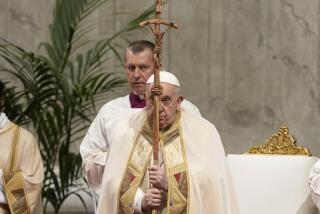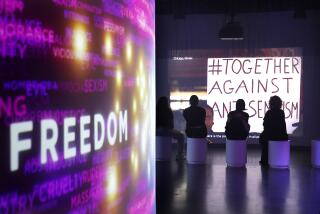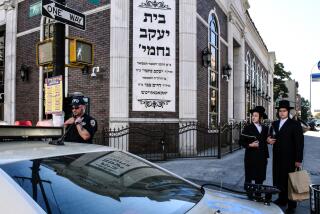American Jewish Committee Leaders Report on Vatican Visit : Pope Reaffirms Catholics’ Rejection of Anti-Semitism
VATICAN CITY — In a private audience Friday with leaders of the American Jewish Committee, Pope John Paul II celebrated the 20th anniversary of the second Vatican Council’s ground-breaking rejection of anti-Semitism by reaffirming the council’s statement “as a word of divine wisdom.”
“He emphasized to us that the council document, which has led to more progress in Catholic-Jewish relations in the last 20 years than in the previous two millenia, is not just another formal statement . . . but a teaching which must be followed,” Rabbi Marc H. Tanenbaum, the committee’s director of international relations, said.
“His statement to us lifts it (the council document concerning Jews) to a level which has not been so clarified until this morning,” Tanenbaum said.
The document, produced in 1965 by Vatican II, emphasized the spiritual patrimony common to Jews and Christians, rejected anti-Semitism and repudiated historic attempts to blame all Jews for the death of Christ and to justify anti-Semitism through the Scriptures. It called for “mutual understanding and respect . . . and . . . brotherly dialogues.”
The pontiff, speaking in English to a group that also included American Jewish Committee President Howard I. Friedman of Los Angeles, board Chairman Theodore Ellenoff of New York and Executive Vice President David M. Gordis, strongly affirmed that the document “remains always for us, for the Catholic Church, for the episcopate and for the Pope, a teaching which must be followed--a teaching which it is necessary to accept not merely as something fitting, but much more as an expression of the faith, as an inspiration of the Holy Spirit, as a word of the divine wisdom.”
He added that relations between Christians and Jews “have radically improved” since the document was issued.
‘Love Between Us’
“Where there was distrust and perhaps fear, there is now confidence,” the Pope said. “Where there was ignorance and therefore prejudice and stereotypes, there is now growing mutual knowledge, appreciation and respect. There is, above all, love between us.”
“These statements are watershed documents in the perspective of 1,900 years of Jewish-Christian relations,” Tanenbaum later told a news conference, pointing out that “there are parts of the world in which unfortunately the (Vatican II) statements have not yet begun to seep in.”
Tanenbaum called the Catholic Church doctrine since 1965 “a 180-degree turnaround in consciousness and mentality.”
“Literally, for 1,900 years, Jews existed (to the church) as objects for conversion. This was deeply insulting to Jews . . . “ Tanenbaum continued.
“The human consequences have been disastrous. For 1,900 years we were characterized as wandering Jews, Shylocks. We became the marginal people of history. This puts an end to that. It is a kind of rehumanization of the Jews. It is a revolution,” he said.
The committee officials also urged the Pope to establish formal diplomatic relations between the Holy See and Israel, rejected until now ostensibly because of a Vatican desire to see Jerusalem internationalized and not recognized as the capital of Israel.
Asked later how the pontiff reacted to the request, Friedman said that in a private chat after the formal audience John Paul “simply acknowledged that there are enormous complexities, but that he understood our concern for Israel. We acknowledged that most of reality has a degree of complexity about it.”
More to Read
Sign up for Essential California
The most important California stories and recommendations in your inbox every morning.
You may occasionally receive promotional content from the Los Angeles Times.










